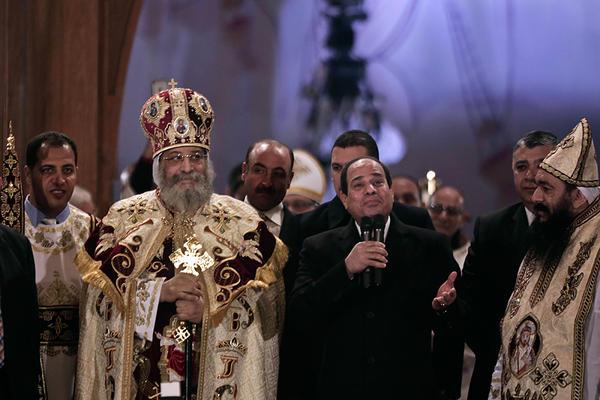Cairo — President Abdel Fattah al Sisi issued a decree Tuesday that allows his government to ban any foreign publications it deems offensive to religion – just days after his foreign minister joined the Paris solidarity march in support of Charlie Hebdo’s right to offend.
This and other contradictions lie at the heart of the president’s approach to religion, eighteen months after he overthrew an Islamist president. For Mr. Sisi, religion lies at the heart of his administration’s statist project – and that’s why he wants to keep a tight grip on religious expression in the most populous Arab country.
The retired Army general began the year with a call for a “religious revolution” in Egypt, a bold attempt to position himself at the vanguard of moderate Islam at a time of rising extremism across much of the Middle East.
His professed goal is to purge the religion of extremist strands of intolerance and violence that fuel groups like Al Qaeda and the Islamic State, both cited by the French Muslim gunmen who terrorized Paris last week.
“It’s inconceivable that the thinking that we hold most sacred should cause the entire Islamic world to be a source of anxiety, danger, killing and destruction for the rest of the world,” he said in a speech to clerics at Al-Azhar University, the highest seat of Sunni learning in Egypt. He called on Egypt’s imams to conduct a “truly enlightened” review of how religious texts were read and propagated
Sisi has also called for religious toleration - on New Year’s Eve, he became the first Egyptian president to attend a Coptic Christmas Eve mass. It was a popular move among Christians, to whom Sisi’s authoritarianism represents a bulwark against the return of the Muslim Brotherhood.
But this is a revolution that Sisi wants to implement via decidedly old-fashioned, and sometimes heavy-handed means. Sisi is seeking to impose change through the state, using official religious institutions like the 1,000-year-old al-Azhar, with backing from the police and the judiciary, which is secular but strongly influenced by Islam.
A conservative vision
Since President Mohamed Morsi’s ouster in July 2013, his followers have been widely depicted as terrorists and subject to mass arrests, and Brotherhood preachers have largely been purged from the country’s mosques.
"[Sisi's] is a conservative vision, just not a radical one," says Nathan Brown, a longtime Egypt scholar based at George Washington University. "It assigns a strong role for the state in protecting what are seen as the rights of the community and public morality in general."
The prosecution of those who are deemed to insult religion – a practice which picked up after the 2011 revolution and attracted stinging criticism during Morsi’s rule – has also continued apace since the popularly-backed 2013 coup.
Egypt's penal code allows the law to get tough on any Muslims who dissents from the majority Sunni population, including Shiite and Baha'is, who face harassment by security forces.
Atheists also tread a dangerous path in Egypt: On Monday, a court sentenced 21-year-old student Karim al-Banna to three years in jail for professing his atheism via social media and for allegedly insulting Islam. He was one of at least six people to be tried for religious defamation in the space of as many months.
Sisi’s so-called religious revolution is “part and parcel of a broader and more traditional statist project,” says Michael Hanna, a senior fellow at the Century Foundation. “This is why both religious expression and religious immoderation are to be tightly controlled, as they are understood as potential sources of instability that could disrupt public order.”
